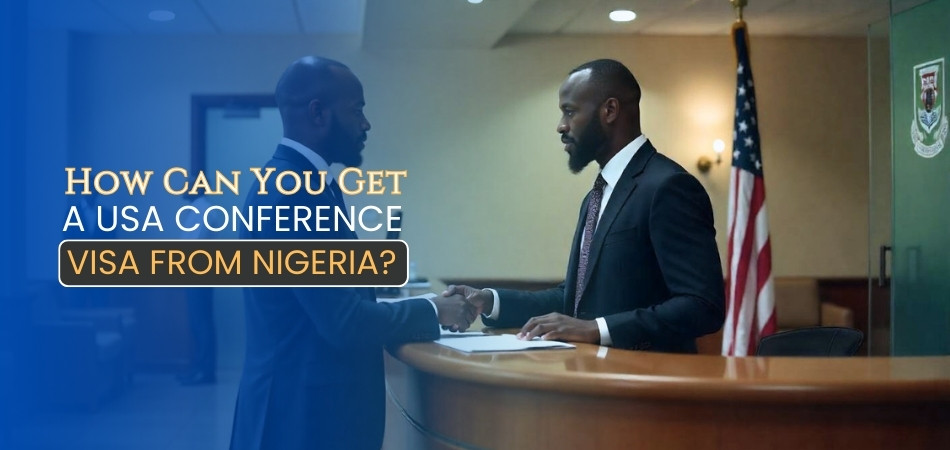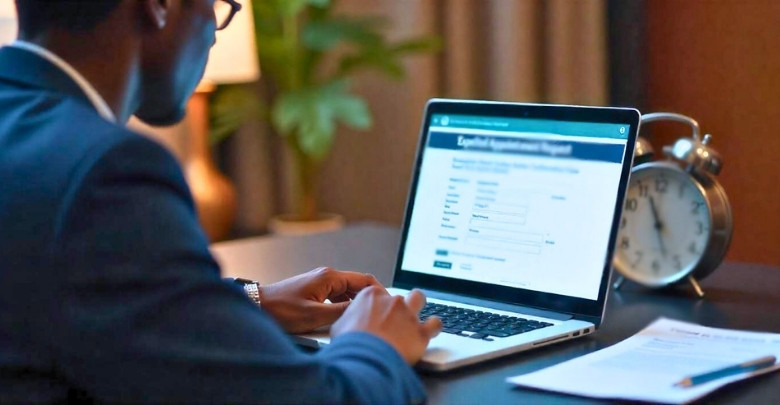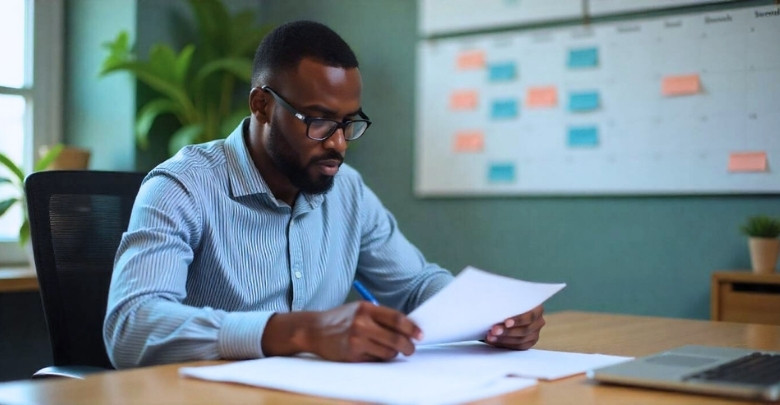It is important to plan carefully before attending a conference in the USA in order to make sure that you have the right visa. The application process involves several steps, and missing any detail can cause delays or even rejection. Do you have any idea how can you get a USA conference visa from Nigeria?
To attend a U.S. conference, Nigerians need to apply for a B-1 Business Visa, which allows short-term business-related visits. The process includes filling out the DS-160 form, paying the visa fee, scheduling an interview, and providing required documents such as a conference invitation letter and proof of financial stability. A well-prepared application increases the chances of approval.
Interested in the details of the application process or in need of guidance on avoiding common mistakes that have been made in the past? This article covers everything you need to know about securing a USA conference visa from Nigeria, helping you go through the steps with confidence.
How Can You Get a USA Conference Visa From Nigeria?
Having the appropriate visa and supporting documentation is necessary to attend a conference in the United States. Nigerian applicants must follow a structured process to improve their chances of approval. A well-prepared application ensures a smooth process and avoids unnecessary delays. Here’s a step-by-step guide on how to secure a U.S. conference visa from Nigeria.
Determine the Right Visa Type
The B-1 visa is the most suitable option for attending a conference in the U.S. It allows short-term business travel, including participation in professional events. Unlike work visas, the B-1 visa does not permit employment or paid activities. Knowledge of visa requirements helps applicants avoid mistakes during the application process.
Get a Conference Invitation Letter
A conference invitation letter is a crucial document when applying for a U.S. visa. It confirms the purpose of travel and provides event details like location, date, and organizer information. This letter helps immigration officers assess whether the trip is legitimate. Applicants should request an official invitation from the conference organizers as early as possible.
Complete the DS-160 Application Form
The DS-160 form is the official application for a U.S. non-immigrant visa. Applicants must fill out this online form accurately and submit all required details. Errors or incomplete information can delay processing or lead to rejection. Once completed, the confirmation page must be printed and kept for the visa interview.
Pay the Visa Application Fee
After submitting the DS-160 form, applicants must pay the non-refundable visa application fee. Payment is made through designated Nigerian banks or online platforms approved by the U.S. embassy. The fee receipt is required during the visa interview. Keeping a copy of the receipt ensures smooth processing at the embassy.
Schedule a Visa Interview
Once the visa fee is paid, applicants must book a visa interview at the U.S. embassy in Nigeria. The interview date depends on availability, so scheduling early is important. Embassy officers will assess eligibility based on the documents provided. A well-prepared applicant has a higher chance of securing approval.
Prepare Supporting Documents
Strong supporting documents improve the chances of visa approval. These may include proof of employment, financial statements, travel history, and accommodation details. If attending upcoming conferences in USA, having proof of event registration can strengthen the application. A complete set of documents shows preparedness and professionalism.
Attend the Visa Interview
The visa interview is an important step in the application process. Applicants must answer questions honestly and confidently while presenting their documents. Officers may ask about the conference, travel plans, or financial stability. A clear explanation of the trip’s purpose increases the likelihood of approval.
Track Application Status and Collect the Visa
After the interview, applicants can track their visa status online. If approved, the passport with the visa will be available for collection or delivered to a designated address. In case of delays, checking the embassy’s website for updates is advisable. Proper planning ensures timely visa processing and a successful trip.
Can Nigerians Get a USA Conference Visa on Short Notice?
Securing a U.S. conference visa can take time, but urgent applications may be possible in special cases. Some applicants face unexpected invitations or last-minute opportunities. If you need a visa quickly, knowing the process is crucial. Here’s what you need to know about getting a conference visa on short notice.
Expedited Visa Appointment Availability
Appointments at the U.S. embassy often fill up months in advance. However, expedited appointments may be available for urgent business-related travel, including conferences. To qualify, you must provide proof of urgency, such as a late invitation. Requesting an expedited appointment through the embassy’s system is the first step.
Importance of a Complete Application
A well-prepared application reduces delays and increases approval chances. Missing or incorrect documents can slow down processing. Ensure your DS-160 form is accurate and all supporting materials are included. A complete and error-free application speeds up the review process.
Demonstrating Urgency for Short-Notice Approval
Applicants must clearly explain why they need a last-minute visa. A letter from the conference organizers confirming an urgent invitation helps. Providing proof of pre-paid travel or other commitments strengthens your case. The embassy may approve urgent requests if the reason is valid.
Paying for Premium Visa Processing Services
While there is no official fast-track service, some steps can be expedited. Paying visa fees promptly and securing the first available interview date helps. Attending the interview with all required documents avoids unnecessary delays. The process still depends on embassy availability and workload.
What to Expect at the U.S. Embassy Interview
A last-minute application may receive extra scrutiny during the interview. Officers will assess whether your trip is truly urgent. Be prepared to explain why you couldn’t apply earlier. Clear and honest responses, backed by documents, improve your chances.
While urgent visa approval is possible, success depends on embassy policies and applicant preparedness. Providing strong supporting documents and explaining urgency can increase approval chances. Planning ahead remains the best way to avoid last-minute visa stress.
How to Prove Strong Ties to Nigeria When Applying for a U.S. Visa?
U.S. visa officers assess whether applicants have strong reasons to return to their home country. Proving strong ties to Nigeria is essential for a successful visa application. These ties show that the applicant has commitments in Nigeria and does not intend to overstay. Here’s how applicants can demonstrate their strong connections to Nigeria.
Providing Proof of Stable Employment
A stable job in Nigeria is a strong indicator of ties to the country. Applicants should submit an employment letter, salary slips, and tax records to prove ongoing work commitments. If the job is well-paying and long-term, it strengthens the case for returning after the trip. Providing proof of leave approval for the conference also helps.
Demonstrating Family Responsibilities
Having family obligations in Nigeria is another strong factor in proving ties. Visa officers consider whether an applicant has dependents, such as a spouse, children, or elderly parents. Submitting birth certificates, marriage certificates, or legal guardianship documents strengthens this claim. A person with strong family connections is more likely to return after their visit.
Showing Financial Stability and Assets
Owning property, businesses, or significant financial assets in Nigeria increases the chances of visa approval. Applicants should provide bank statements, land documents, or business registration certificates as proof. Having investments or assets that require personal management suggests a strong reason to return. A well-documented financial position supports the applicant’s credibility.
Submitting Educational Commitments
For students or academic professionals, proof of ongoing education can establish strong ties. Enrollment letters, tuition payment receipts, or academic transcripts confirm that the applicant has an obligation to return. Students attending conferences can use these documents to reinforce their case. Educational commitments add credibility to short-term travel plans.
Including Business or Professional Ties
Entrepreneurs and business owners must show that their company requires their presence in Nigeria. Business registration documents, tax records, and proof of ongoing projects can help. If an applicant has professional affiliations, submitting membership certificates from recognized organizations strengthens the case. Maintaining active business operations in Nigeria assures officers of the applicant’s return.
Demonstrating a Well-Planned Trip
A clear itinerary with a return ticket reassures immigration officers of the applicant’s plans. Booking round-trip flights and showing accommodation details can support this claim. If attending a professional event, providing proof of event registration helps. Having a well-structured plan adds confidence to the application and increases the ease of obtaining a USA conference visa.
Maintaining a Clean Travel History
A history of following visa rules increases an applicant’s credibility. If the applicant has previously traveled and returned within the allowed period, it demonstrates compliance. Submitting past visa stamps and entry-exit records supports the case. A positive travel history strengthens the argument for a short-term visit.
Can You Reapply After a U.S. Conference Visa Rejection?
A U.S. conference visa rejection can be disappointing, but it does not mean you cannot try again. Being aware of the reasons for rejection and improving your application increases your chances of success. A well-prepared reapplication can address previous concerns. Here’s what you need to know about reapplying for a U.S. conference visa after rejection.
Understanding the Reason for Rejection
Before reapplying, it is important to understand why your visa was denied. Common reasons include insufficient documentation, weak ties to Nigeria, or financial instability. The denial letter from the U.S. embassy usually provides details on the reason. Identifying and addressing these issues is crucial for a successful reapplication.
Waiting Before Reapplying
There is no mandatory waiting period to reapply after a visa rejection. However, reapplying immediately without making necessary improvements can result in another denial. It is advisable to take time to correct previous mistakes and strengthen the application. Gathering stronger supporting documents increases the chances of approval in the next attempt.
Strengthening Supporting Documents
A strong application requires complete and accurate documents. Applicants should submit a well-drafted invitation letter, proof of event registration, and financial statements. If a previous rejection was due to missing documents, ensuring all required paperwork is included can make a difference. Providing updated financial records and a clear travel itinerary improves credibility.
Proving Strong Ties to Nigeria
One of the most important aspects of reapplying is proving strong ties to Nigeria. Immigration officers want assurance that the applicant will return after the conference. Submitting proof of employment, property ownership, or family responsibilities strengthens the application. The stronger the ties, the higher the chances of visa approval.
Improving the Visa Interview Performance
A poor interview can lead to visa denial, even if the documents are in order. Reapplicants should prepare to answer questions clearly and confidently. Practicing expected questions and maintaining honest, concise responses can help. Demonstrating a well-structured plan for attending the conference reassures immigration officers.
Addressing Financial Stability Concerns
If financial proof was a reason for rejection, reapplicants should provide stronger evidence of funds. Updated bank statements, employer sponsorship letters, or business financial records can support the case. Showing the ability to afford the trip without financial risk is crucial. Sufficient funds make the application more convincing.
Ensuring Compliance with U.S. Visa Policies
Applicants should review all visa rules before reapplying. Checking the latest visa requirements for Nigerians attending conferences ensures compliance with U.S. immigration policies. Learning about these regulations helps avoid errors that could lead to another rejection. A well-informed applicant has a better chance of securing a visa.
Frequently Asked Questions
Applying for a U.S. conference visa from Nigeria can be a detailed process, and many applicants have additional questions beyond the basic requirements. Below are some frequently asked questions to help you understand key aspects of the application and approval process.
Can a Travel Agent Help With My U.S. Conference Visa Application?
Yes, a travel agent can assist with completing your visa application, scheduling an interview, and ensuring your documents are in order. However, they cannot guarantee approval, as visa decisions are made solely by the U.S. embassy based on your qualifications.
Does My Travel History Affect My U.S. Conference Visa Approval?
Yes, your travel history can influence the decision. A record of past international travel, especially to countries with strict visa policies, may strengthen your application. However, first-time travelers can still get approved by proving strong ties to Nigeria.
Can I Apply for a U.S. Conference Visa Without a Sponsor?
Yes, you can apply without a sponsor, but you must prove financial stability to cover travel, accommodation, and other expenses. If you are self-funding, strong bank statements and financial documents are required to show you can afford the trip.
Do I Need a Police Clearance Certificate for a U.S. Conference Visa?
No, a police clearance certificate is generally not required for a B-1 visa application. However, if you have prior legal issues, the embassy may request additional documents to assess your eligibility. Having a clean record improves approval chances.
How Soon Should I Apply for a U.S. Conference Visa Before the Event?
It is advisable to apply at least 2-3 months before your conference. Visa appointments can fill up quickly, and processing may take weeks. Applying early ensures you have enough time to complete all formalities and avoid last-minute stress.
Can I Use My U.S. Conference Visa for Future Conferences?
If your B-1 visa is still valid, you can attend multiple conferences in the U.S. However, each visit must align with the visa’s intended purpose, and you should always carry documents related to the event you are attending.
What Should I Do if My Visa Is Approved but My Conference Gets Canceled?
If your visa is approved but the event is canceled, you can still travel for other short-term business-related activities permitted under the B-1 visa. However, you should carry alternative documents proving the purpose of your visit.
Can I Apply for a U.S. Conference Visa While Holding a Valid Schengen Visa?
Yes, holding a Schengen visa does not affect your U.S. visa application. However, your U.S. visa will be assessed separately, and you must still meet all requirements, including proving strong ties to Nigeria and financial capability.
Can an Employer Apply for a U.S. Conference Visa on My Behalf?
No, your employer cannot submit the visa application for you. You must personally complete the DS-160 form and attend the interview. However, your employer can provide supporting documents, such as an invitation letter or proof of sponsorship.
Will My Social Media Be Checked During My Visa Application?
Yes, U.S. visa applications may require you to provide details of your social media accounts. Consular officers may review your online presence to check for inconsistencies in your application. It’s important to ensure that your social media reflects accurate information.
Can I Apply for a U.S. Conference Visa If I Was Previously Denied a Tourist Visa?
Yes, a previous tourist visa denial does not automatically disqualify you. However, you must address the reasons for the previous denial and submit stronger supporting documents to improve your chances of getting the conference visa approved.
Do I Need a Letter From My Employer to Apply for a U.S. Conference Visa?
While not mandatory, a letter from your employer can strengthen your application. It should confirm your employment, explain why you are attending the conference, and assure your return to Nigeria. This document helps demonstrate professional ties to your home country.
Final Thought
Securing a U.S. conference visa from Nigeria requires careful preparation and attention to detail. From gathering necessary documents to attending the visa interview, every step plays a role in determining approval. A well-prepared application reduces delays and increases the chances of a successful outcome.
If you’re asking, how can you get a USA conference visa from Nigeria?, the process starts with applying for a B-1 Business Visa. Applicants must fill out the DS-160 form, pay the required fee, and schedule an interview at the U.S. embassy. Submitting a conference invitation letter, proof of finances, and strong ties to Nigeria improves approval chances. To make the process smoother, apply early, double-check all documents, and be honest during your visa interview.








